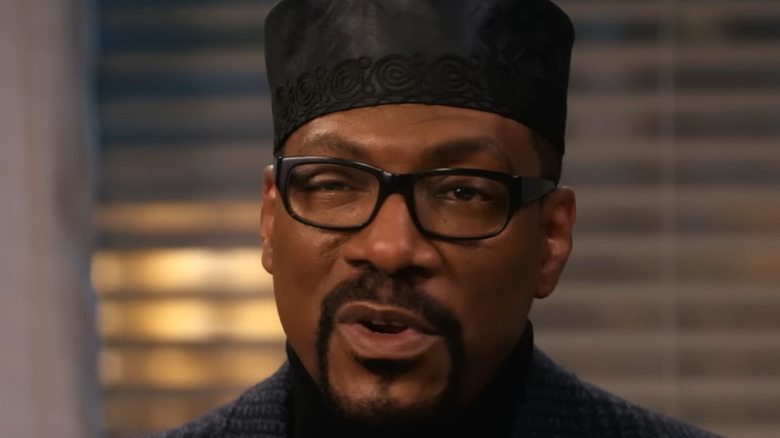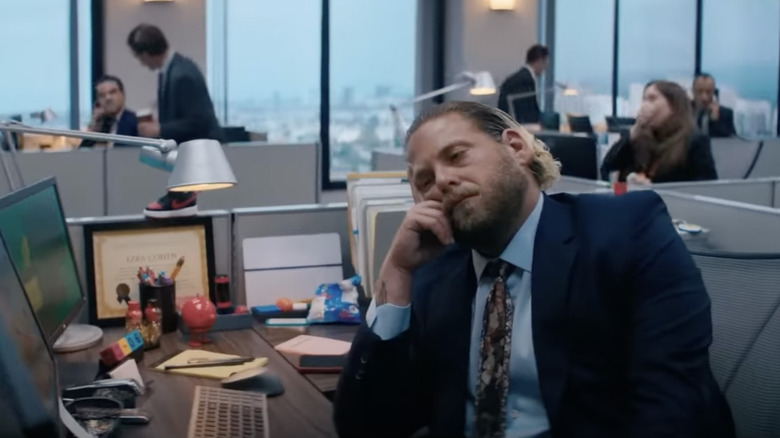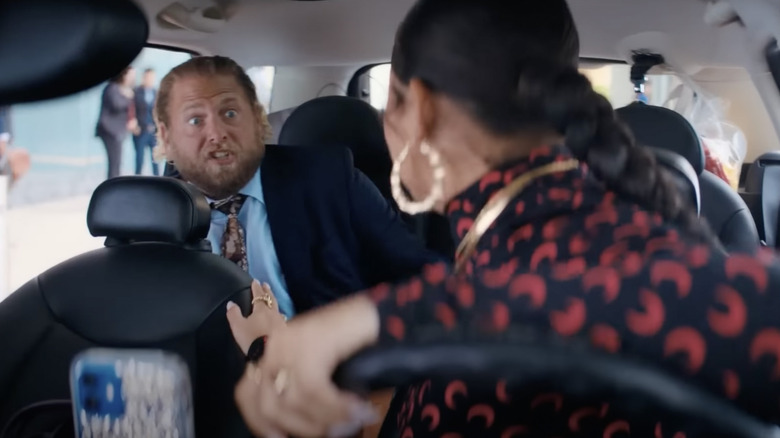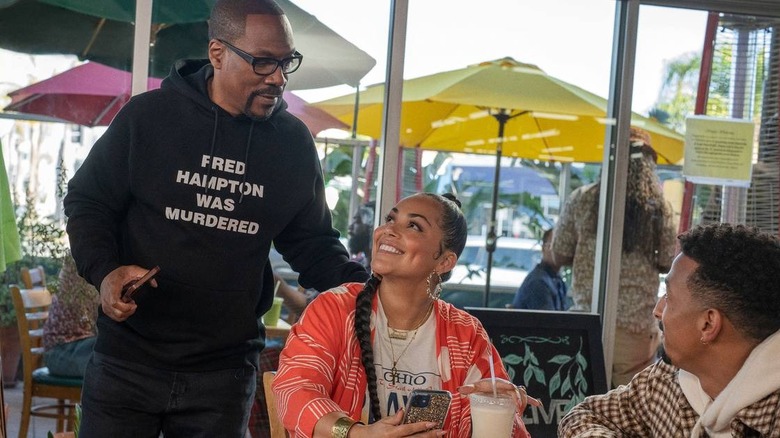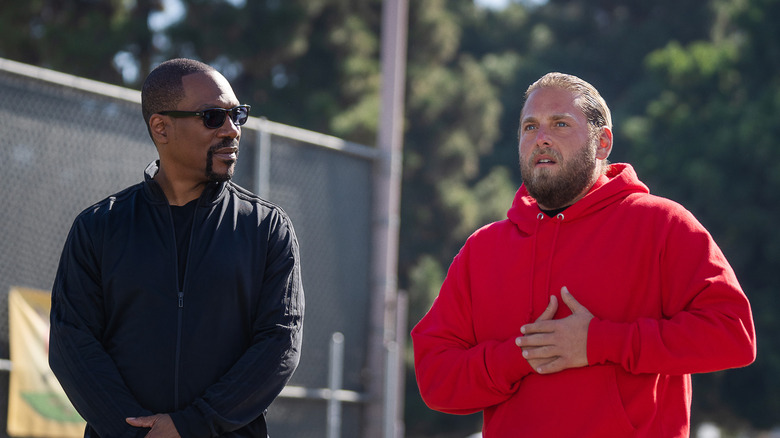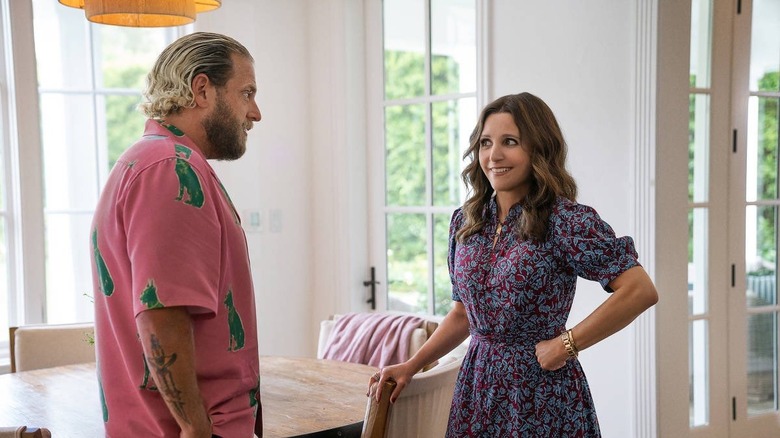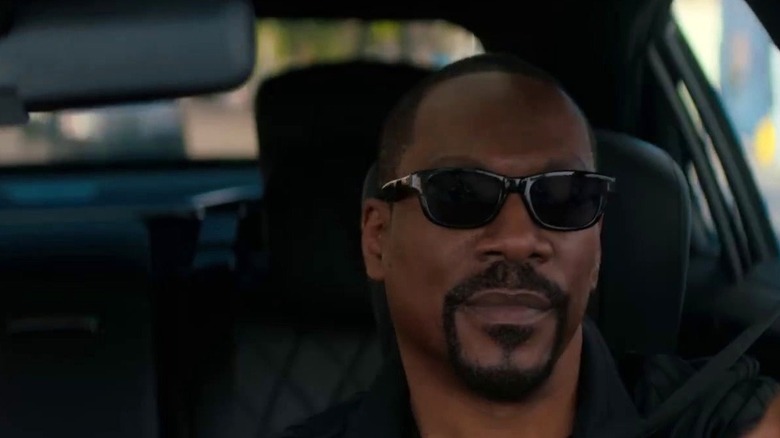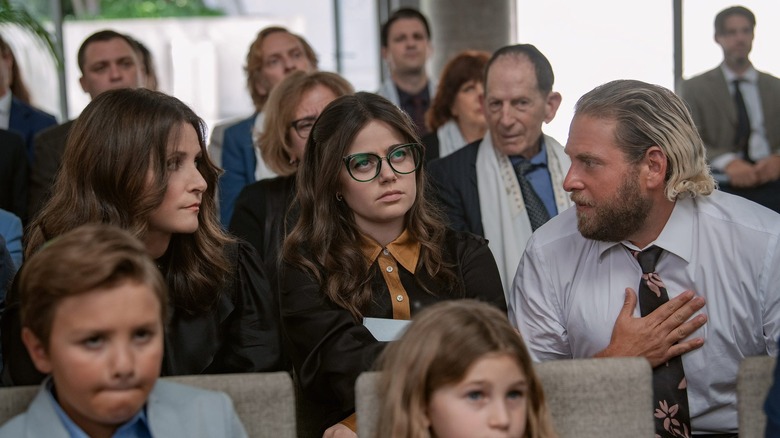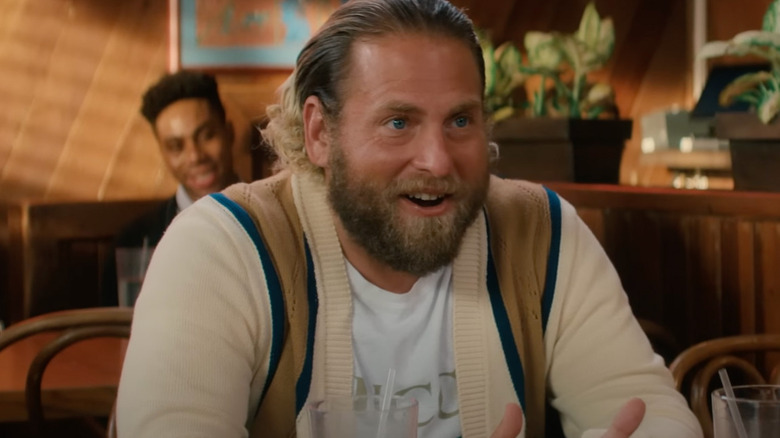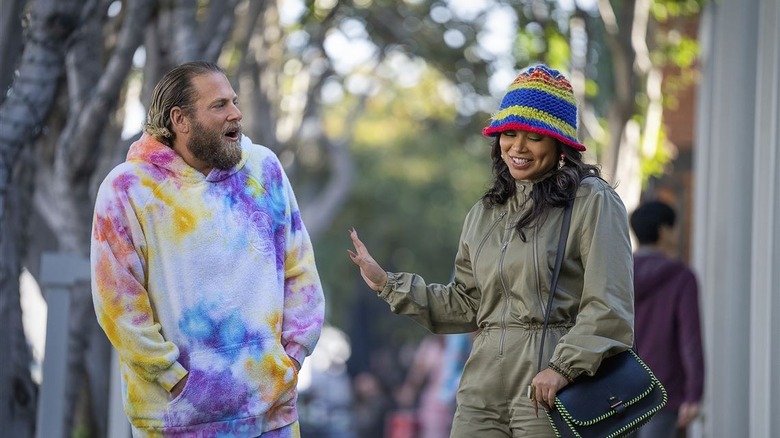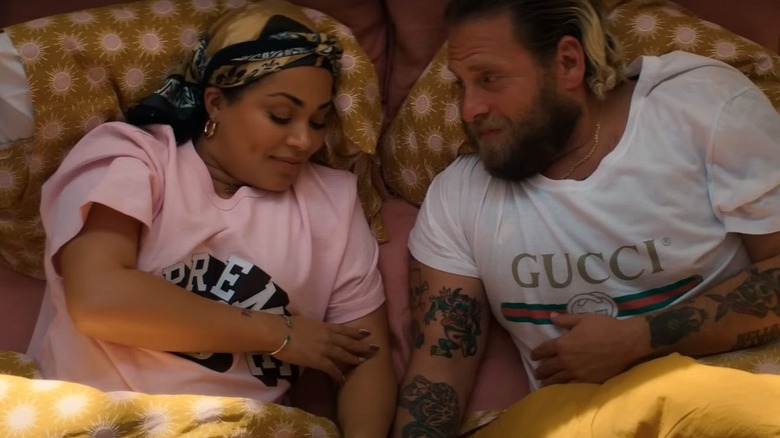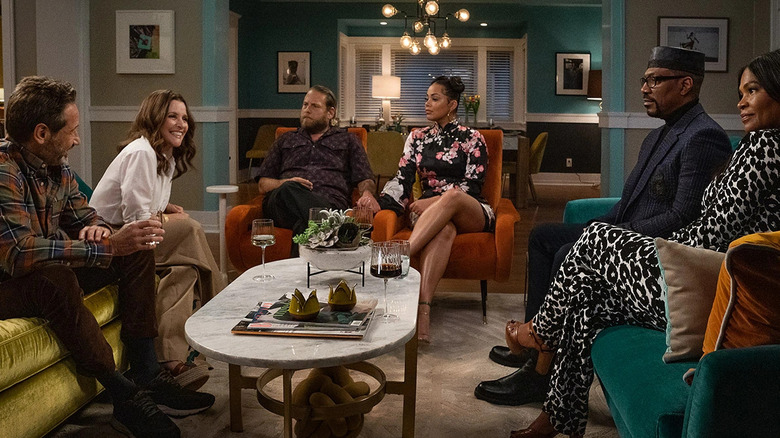The 12 Most Hilarious Moments From Netflix's You People, Ranked
Back in 1967, "Guess Who's Coming to Dinner" put an interracial couple on screen at a time when such relationships were still against the law in parts of the United States. Since then, mixed race marriages and families have become far more common, both in movies and on TV and in life.
They've been used as the premise for comedy (the "Dinner" remake "Guess Who"), historical drama ("Loving"), and horror ("Get Out"), to varying degrees of success. The latest to mine the tension between romantic partners from different backgrounds is Netflix's "You People," co-written by Jonah Hill (who also stars) and Kenya Barris (who directs and appears in a cameo).
Barris is best known as the creator of the sitcom "black-ish." The cleverly titled "You People" — a reference to the Black and Jewish families at its story's center — might seem like a feature film version of a situational comedy with comic actors like Julia Louis-Dreyfus and Eddie Murphy in prominent supporting roles, but the film is more like the Poitier/Spencer Tracy/Katherine Hepburn classic than a slapstick-y episode of "SNL." "You People" repeatedly puts its characters in uncomfortable situations, but at almost every turn, instead of going big and silly, things turn contemplative and introspective. Its jokes aren't overly broad, but they are often a little too obvious, especially when it comes to race, religion, and culture in general. "You People" is at its best when poking fun at the personal rather than just the socio-political; here are the 12 funniest examples.
12. Ezra quits his job
Ezra is the 35-year-old son of three generations of podiatrists. Professionally, he went a different route. We hear his voice before we see his face, podcasting with his best friend and business partner, Mo. But at this time in his life, podcasting is a hobby and a passion. His day job is in finance, where he works under an aggressive, hard-to-read boss named Dan played by former Upright Citizens Brigade improv master Matt Walsh.
Once Ezra and Amira are engaged and have purchased a house, she supports his decision to quit his 9-to-5 to pursue podcasting full time. It's unclear whether this is meant to be funny in and of itself. Professional podcaster has become the career of choice for a plethora of characters in recent movies. Before he gives his two weeks notice, Amira pumps Ezra up. After a hard cut, we see Ezra tiptoe into Don's office as he's screaming at someone about car repairs. Ezra's pathetic resignation is chuckle worthy. Rather than tell his boss off as he'd planned, he hands him a resignation letter, mumbles on about how he's going to work at a different address doing a different job, then runs away in fear and shame.
The much funnier part of the scene is something viewers may not have even noticed. On blowhard Don's computer screen is a news article titled, "Wakanda Doesn't Pay Taxes. Why Should You?" Another open browser window has to do with avoiding penalties for tax evasion.
11. Amira and Ezra's meet cute
For most people, the strongest element of "You People" will probably be the relationship between Hill's Ezra and Lauren London's Amira. In the spirit of a truly modern romantic comedy, no one party has to win the other's affections by tricking them or wearing them down, as was so often the case in rom-coms from even 10 years ago. Once they find each other, Ezra and Amira genuinely care for each other, try to understand each other, accept each other as they are, and support each other as equals. But this is a romantic comedy, so before all that wholesome stuff can happen, there has to be a meet cute.
Ezra and Amira's meet cute is, well, actually pretty cute; it also happens to utilize the social commentary the film wants to make for both substantive and comedic ends. Ezra has ordered a ride share service just as Amira is trying to make it to a gig on time. She's hopelessly lost and momentarily parks her Mini Cooper in front of Ezra's building. He jumps into the backseat and she freaks out, first because there's a stranger in her vehicle and then because she's offended the stranger assumed she was an Uber driver. Ezra admits that what he did looks like "a racism," but then he shows her the photo of his driver and her car. They agree that the resemblance is uncanny — a real "23 and Me" situation — and make plans to see each other again.
10. Bruno Mars is the future
Eddie Murphy as Akbar Mohammed makes his presence known before he even saunters into view. Murphy plays Amira's father, and we can tell from the way she and her brother, Omar, discuss him that he has exacting expectations for his children. Just as Amira's talking to Omar about her upcoming date with Ezra, Akbar joins them for smoothies wearing a "Fred Hampton Was Murdered" hoodie. He complains to his kids about how their neighborhood has become gentrified. While Omar appreciates the economic independence and increased market share that more affluent customers have given their shoe stores and fried chicken joints, Akbar wishes they could keep their culture to themselves.
He looks around the restaurant and notices that he's the darkest person in the room, which bothers him. "Eventually everybody gonna be looking like Bruno Mars," Akbar says.
"You People" comes back to stereotypes about mixed race children on multiple occasions. Shelley Cohen is a little too excited to have Black grandbabies. Ezra gives an awkward book report-sounding speech about Amira's parents about history's greatest multiracial luminaries. Both of these jokes accurately depict how well-intended non-Black people can be patronizing about biracial identity. Akbar's Bruno Mars joke is something different. It's a harmless jab at a musician who's been at times accused of cultural appropriation, but it's also a reflection of Akbar's own anxieties about how gentrification is diluting his heritage. Omar — who has just found out about Ezra — responds to the Bruno Mars joke by telling his dad it's going to happen sooner than he thinks.
9. Ezra's good at basketball
Nearly every time "You People" sets up its characters for what seems like an over-the-top payoff, the opposite happens. Whether that's evidence of restraint or of missed comedic opportunities is in the eye of the viewer. The visit to the barber shop, the bachelor and bachelorette parties, and the rehearsal dinner don't really escalate to mayhem the way they might have in a movie like "The Hangover" or "Bridesmaids." The best example of how "You People" zigs when expected to zag is the scene in which Akbar and Ezra — spending some quality time together for Amira's sake — go to a basketball court. Akbar inserts Ezra into a pick-up game, gets out his phone, and starts live-streaming, clearly anticipating that his son-in-law-to-be will inevitably embarrass himself.
Instead, after some initial hesitation, Ezra tears it up on the court. Akbar's faulty assumptions about Ezra surely have to do with his race and general appearance (he waxes poetic about tall, muscular men throughout the film) as much as his doubts about how much Ezra's really connected to any Black communities. The plot twist is nice if not totally surprising. Ezra was going to be either really good or really bad at basketball; the writers made the more satisfying choice. Not only does Ezra easily score points and steal the ball, he makes new friends and asks to be included on a group text. An extra layer of humor comes from Akbar's disappointment; he stops filming once he sees what's up.
8. Shoe references
There are running jokes throughout "You People" about shoe culture, and thankfully, they're more than just Easter eggs for people who wait for the latest Nike drops. Shoes are yet another symbol of the way pop culture often evolves from something that a minority group claims for itself into a trend participated in by the masses. Amira is a designer who has found success despite her gender and race. Near the end of the film, we see her lose out on a contract because she went to Howard and not Harvard. In that interview, she touts her connections to fabric manufacturers and to street culture, and at various points in the film, we see how she's the type of person who originates (as opposed to amplifies) trends.
The relationship between her and Ezra progresses as they shop for shoes together, eventually purchasing matching pairs. The audience had already been clued into Ezra's love of sneakers when he was called out by his sister for wearing brightly patterned green dunks to the synagogue. Before he proposes to Amira, Ezra takes off his shoes so he doesn't crease them, and the film's resolution happens because his mother wants his help picking out some dunks for herself, since her friend Diane Kaplan's son bought her some and she won't stop talking about them. Of course, it's all a ruse for Akbar and Shelley to get Amira and Ezra back together, but that a middle aged Jewish mom would want the most popular shoes of the year in the first place is smart commentary on the path trends take.
7. Eddie Murphy doesn't do impressions
This one's a brilliant in-joke for Eddie Murphy fans. Before they get to the basketball courts and the barber shop, Ezra and Akbar spend some time getting to know each other in the car. Ezra sits silently hoping for small talk, but Akbar gets straight to the point.
"Amira told me that you gave up a job in finance so that you could start a podcast?" he asks. Ezra tries to defend his decision, saying that he knows it sounds crazy, but that Amira thinks he should go after his dreams. Akbar points out that that's the mindset of a white person who comes from generational wealth, then asks if he has any dream bitcoin or a dream 401(k).
Ezra passionately promises Akbar that he'll give podcasting everything he has, which Akbar mocks by mimicking his voice. His future son-in-law stands up for himself and says that he can handle the jokes, to which Akbar coldly responds that it wasn't a joke. "I don't do impressions," he deadpans.
This is hilarious on two counts. Murphy as Akbar was doing a pretty spot-on impression of a WASP-y person talking about his dreams only seconds earlier. But the much funnier part of the line is that Murphy rose to prominence doing several impressions. From his stand-up specials to his "Saturday Night Live" days, Murphy impersonated notable figures including Muhammad Ali, Bill Cosby, Elvis, Fred Rogers and his brother Charlie. It's a talent he showcased in Jerry Seinfeld's "Comedians in Cars Getting Coffee," when he rattled off takes on everyone from Tracey Morgan to Michael Jackson.
6. Yom Kippur
Netflix viewers get to meet the Cohens before the Mohammeds, mostly because Ezra is the audience's avatar. "You People" seems slightly less interested in Jewishness than it does Blackness on the whole, but an early scene that takes place on Yom Kippur is an exception. The Cohens whisper barbs at each other during the service. Ezra's grandmother (Rhea Perlman) scolds him for forgetting his yarmulke and says he won't be able to be buried in a Jewish cemetery (Ezra doesn't care because "respectfully" he'll be dead). Shelley curses. Liza tells Ezra that he looks like a dad that lost his kid at Coachella. Ezra shoots back that she looks like the principal of a Hebrew school version of Hogwarts.
Things only get weirder in the social hour that follows. Ezra gets asked how old he is, whether he has a girlfriend, and (inelegantly, to say the least) whether he likes girls. His dentist turns out to be a pervert, which he learns is common knowledge among the congregation, and his mom is more interested in setting him up with a woman named Kim Glassman. Shelley likes Kim's body and her mind (she just completed her graduate studies at Harvard) and she thinks Ezra might have a chance with her because, at the moment, she's totally wasted. "You People" doesn't really stick with such raunchy, non-sequitur comedy after this scene, and not all of the gags land, but the ones that do are a good laugh.
5. Ezra meets Amira's parents
The comedy stylings of "You People" can best be described as secondhand embarrassment combined with earnest attempts at on-the-nose discussions about race relations. The majority of the film's skits and monologues that have to do with race — particularly the extended dinner scene when the Cohens and Mohammeds meet each other — get an A for effort but a C or worse for execution. Of these, the scene in which Ezra takes Amira's parents to Roscoe's for lunch does the best job of balancing cringe with commentary.
In a nervous sweat-inducing diatribe, Ezra manages to touch on all four verboten subjects — race, religion, politics, and sex — best left out of polite conversation, (particularly when trying to make a good first impression on a girlfriends' mom and dad). It's not the content of Ezra's takes on Malcolm X and Amira's sexuality that make this moment more enjoyable than the movie's other attempts at broaching the topics, it's the fact that Ezra knows he should stop talking and can't.
Three of the sharpest jokes in "You People" occur during this exchange. Ezra, worried that a server hasn't come yet, gets up to track one down. He returns to the table and reports that the waitress was upset he interrupted her smoke break. In making his case to Akbar and Fatina (Nia Long), he compares his relationship with Amira to the friendship between Forrest Gump and Bubba. Later in the conversation, a frustrated Akbar says they've never seen "Forrest Gump," and complains that Ezra's people made him get a vaccine before he could go into the casino.
4. Ezra's sweatsuit
Fashion plays a big part in "You People." Besides the fact that Amira's a designer, the way characters dress says a great deal about how they see themselves. Akbar wears a Muslim kufi to dinner; Shelley can't figure out how to compliment Amira's friends on their crop tops and earrings; Ezra reflects on his own personal style with Mo as he shops in preparation for his date.
In the scene, Mo warns her friend that Amira might be out of his league and suggests it's bold of him to ask out a Black person at a time of heightened racial tension. Ezra takes offense and defends himself by insisting that he's not interested in Amira because she's Black or because it's cool in his liberal circles to date outside of one's race. "I'm not talking about a tie dye sweatsuit," he says, "I'm talking about a person." He tells Mo that Amira is unlike anyone he ever met. "Yo, please tell me you didn't buy a tie dye sweatsuit," Mo says back.
A split second later, we see Ezra and Amira seated at a restaurant table. Ezra is indeed wearing a pastel tie dyed sweatsuit on his first date. It's a simple sight gag, made funnier because of the editing, but it's also proof that Ezra really is the kind of person who does his own thing. Amira's that kind of person, too. It's what drew them to each other. Still, the colorful coordinated hoodie and shorts is a lot of look.
3. Arnold plays the piano
The vast majority of the jokes about the Cohens have to do with how terrible they are at being normal around — let alone allies to — Amira and other Black people. They're an overly apologetic white progressive family in the vein of the Armitages from "Get Out." Both Shelley and her husband Arnold (David Duchovny) try so hard that sometimes it hurts to watch. These attempts at topic humor miss the mark when they're predictable, as is too often the case with the dialogue of Louis-Dreyfus. She tells Amira that their housekeeper, Lupita from Guatemala, is like family and that her job isn't even like work for her.
Arnold, on the other hand, gets a much more specific opportunity to fail miserably at being cool around his Black guest. While Ezra and Shelley are in the kitchen talking about his intention to propose, Arnold (David Duchovny) has taken a seat at the piano and has begun to serenade Amira with a strained, off key rendition of John Legend's "Ordinary People." The lyrics, combined with his self-seriousness and awful delivery are hysterical, but Amira's face when Ezra walks back into the room is priceless. As a polite first-time visitor to their home and Ezra's new girlfriend, she's held captive by his performance and only he can save her. "You People" returns to the music well again when Ezra (with Akbar and Amira with Shelley) have to sing along to the car radio, but Duchovny's ill-advised piano solo is hard to beat.
2. Holocaust ring
Although Netflix describes it as edgy, and although the very idea of digging into Jewish and Black relations in a movie is a bold exercise, the actual writing in "You People" isn't all that risqué. Sure, there are allusions to sensitive subjects like Black hair, Jewish wealth, Louis Farrakhan, west coast gangs, the January 6th insurrection, and vaccine conspiracy theories... but most of the edges of those comments have been sanded off. The joke that comes closest to crossing the line is also one of the film's funniest.
Ezra shows Mo the engagement ring he's picked out for Amira, and Mo can't help but notice how small it is. "You got to make up a story or something for this, bro," Mo advises him. "I'm just gonna be like, it's my gramma's holocaust ring," he decides. But Mo points out that he can't say it's his grandmother's ring if it's in a brand new box, advising, "You wanna put it in, like, a satchel." Ezra agrees to "dirty up" and "holocaust down" the store bought ring to make the lie more believable.
It's tough to joke about the holocaust (and slavery, as we see when Shelley and Akbar compare suffering notes), but this joke isn't really about the extermination of Jews. It could be seen as an instance of in-speech... when an oppressed group reclaims the painful language of which they were victims. Ezra is using it to be self-deprecating about his inability to buy a bigger diamond. His lie hilariously falls apart as soon as Amira starts asking questions, realizing his "Bubby" would've been about four-years-old during World War II.
1. Wedding planning
By far, the funniest part of "You People" has nothing to do with race, religion, or anything remotely contemporary. The biggest laugh comes from a totally out-of-left-field reference to a 1982 science fiction movie.
The Mohammeds and Cohens have gathered to plan Ezra and Amira's upcoming wedding, each with their own chosen wedding planner. Shelley has brought along a friend — the very picture of a basic white lady — who wants to throw an Old Hollywood-themed affair. Akbar and Fatima object on the grounds that Black performers were discriminated against at the time. Their candidate for wedding planner is Amira's cousin, Demetrius, who does "day parties at the airport Doubletree."
Demetrius was thinking "more of like a Tron-type feel" but "a hood Tron," with LED light suits, of which he owns 40. Shelley wants clarification. Demetrius explains that everyone will pick their own color of Tron suit, but that "you gotta git in where you fit in, first come first serve." Akbar likes it. "Ain't nobody did the Tron wedding," he says. He calls the red Tron suit and Demetrius announces, "so the red is gone."
Such wedding planning is so absurdly hyper-specific that it might make viewers wish more of that tone was peppered throughout "You People." The only thing that doesn't work about it? The movie completely wastes the chance to give Ezra and Amira the surprise light up hood Tron wedding (presumably at the airport Doubletree) that they could've had — and that we deserved.
